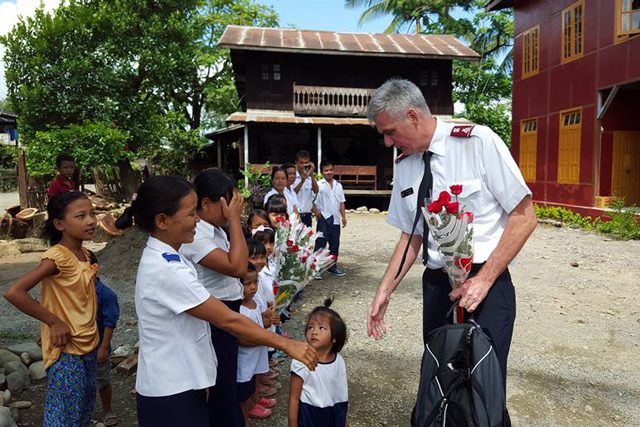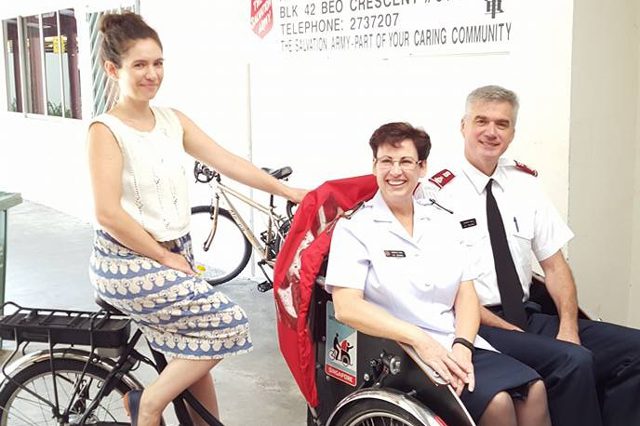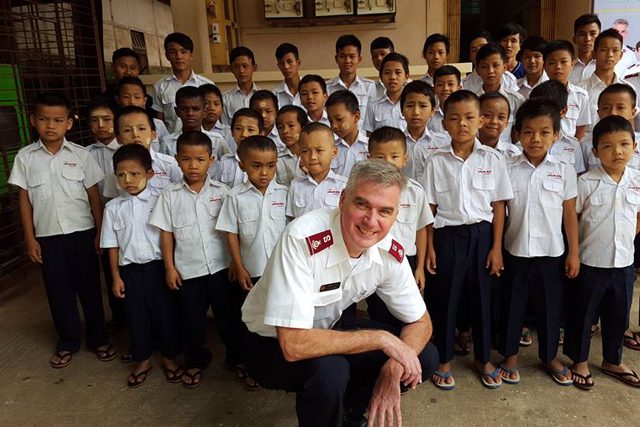Since July 1, USA Western Territory officers Lt. Colonels Edward and Shelley Hill have served in the Singapore, Malaysia and Myanmar Territory as Chief Secretary and Territorial Secretary for Women’s Ministries, respectively. Prior to this, they served at USA Western Territorial Headquarters as Secretary for Program and Women’s Ministry Program and Resource Secretary.
New Frontier Chronicle checked in with them about their experience so far, and Edward Hill shared the following.

How does the reality of serving in the Singapore, Malaysia and Myanmar Territory differ from what you expected prior to your arrival there?
The Singapore, Malaysia, and Myanmar Territory is very diverse, more so than I think I even imagined. From Singapore to the top of Myanmar is approximately 1,800 miles, so it is a big territory, and also tremendous diversity in language and economic prosperity. The total population of the three countries is about 85 million, so it is a large number of people. I suppose the biggest adjustment we have encountered is living and serving in a place in which culturally and numerically Christianity is not dominant. This presents challenges to The Salvation Army but provides great opportunities as well.
How well-known is The Salvation Army in this part of the world? What is the religious climate of the territory? Does it differ among the three countries?
Malaysia is nearly 90 percent Muslim, Myanmar is nearly 90 percent Buddhist, and Singapore is comprised of religions that more than 80 percent non-Christian, so while the Army is vibrant and recognized in many sections of the territory, there are large sections of the territory (especially in Malaysia and Myanmar) that The Salvation Army has yet to take root. We are making progress on many fronts but more resources are needed.
The Singapore, Malaysia and Myanmar Territory is planting the work of The Salvation Army in Thailand, so our reach continues to expand throughout the globe. Thailand is primarily a Buddhist nation, so it will take some time for the Army to be established there, but it will.

Singapore is known to be a developed country, cosmopolitan, multicultural and tolerant of differences. What are the social service needs here, and in Malaysia and Myanmar? It seems that the territory might be diverse in terms of need.
Singapore is a very prosperous country. Of course, there are human needs here too. For example, the Army’s work with the elderly is in response to a great need. There are many seniors who come into circumstances where they need additional support—financially and socially—to cope with the challenges of getting older. The Army does that very well here.
Malaysia has a rather extensive network of boys’ and girls’ homes. The kids in these homes are here for a variety of reasons. Many of the children have been in residence with the Army for 15 or more years and quite a few of our officers are graduates of the various homes. We have particularly enjoyed meeting the children in the homes and interacting with the dedicated officers and staff who help make these institutions pleasant and comfortable for these beautiful children.
Myanmar is a developing country with lots of challenges but also great potential. About half of the population survives on subsistence farming. The Salvation Army has done some amazing work in the development of micro credit projects, assisting people to create businesses including printing, farming, tailoring and shop keeping. One of my favorite visits was to a rural village in which the Army operates a one room and modestly equipped and furnished health clinic for 12 neighboring villages. It is the only medical services available for many miles. I asked the Army’s nurse if she had ever assisted mothers in childbirth and she modestly responded that she had actually safely delivered over 180 babies since 2004. Amazing.
The Army has also done great work in Myanmar responding to natural disasters. I visited one village with five homes and a corps building built by the Army for villagers whose former homes (and the corps building) had been destroyed by floods just a year ago. With moments to spare, one brave Salvationist had time to grab just one item from the corps as it was washed away—the corps flag. It was a deep privilege to gather with that congregation—in the presence of that tattered flag—and thank God for his provision and the ministry of the Army to resettle the people of that devastated village into new homes to live and corps to worship.

Does the Army partner with other organizations to meet people’s needs? Is the Army able to fund needs in Malaysia and Myanmar through fundraising and partnerships in Singapore?
The Salvation Army is reasonably well supported in Singapore and is able to send resources to Malaysia and Myanmar to assist in the work in those countries. International Headquarters also provides very generous funding to Myanmar. These external sources of support are crucial to the continued and growing work of The Salvation Army in the territory. As always, we wonder how much more we could accomplish to carry forward the mission if we had even more money and personnel available. It will come in time.
Some of what we read about Singapore is quite compelling, especially in terms of tolerance. Is this something you’ve observed? What can the rest of the world learn from Singapore about tolerance?
Singapore—much like the United States—is a gathering place for people from many nationalities throughout the world. We are really enjoying living here. However, I am continually reminded there is always room to learn to become more accepting of the racial, cultural, religious and other differences that often separate ourselves from others. This growth happens best when people realize that the God of love expects his people to enthusiastically love him, others and ourselves.

Your greatest challenge?
As you might expect, we miss the USA West and our family, friends, and the familiar…but we are really enjoying serving in the Singapore, Malaysia and Myanmar Territory. This is a great place to be and the officers, soldiers, and employees of the territory are first rate in every way. Indeed, our lives are marked much more by a celebration of God’s blessings than by any hint of personal sacrifice. We are very grateful to Commissioners James and Carolyn Knaggs (and the entire THQ leadership team) for their great support of us and our family. The provision of the territory has been truly overwhelming and heightened our sense of peace during this journey of service away from the USA West that we are finding to be a great joy…God bless the USA Western Territory!












